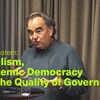qualifies
The Democratic Inclusion of Artificial Intelligence? Exploring the Patiency, Agency and Relational Conditions for Demos Membership
Philos. Technol.35, 24 Abstract Should artificial intelligences ever be included as co-authors of democratic decisions? According to the conventional view in democratic theory, the answer depends on the
Do Employers Prefer Fathers? Evidence from a Field Experiment Testing the Gender by Parenthood Interaction Effect on Callbacks to Job Applications
European Sociological Review, 2017, Vol. 33, No. 3, 337–348 In research on fatherhood premiums and motherhood penalties in career-related outcomes, employers’ discriminatory behaviours are often argued
NEW SEMINAR: Social Networks, Employee Selection and Labor Market Outcomes: Toward an Empirical Analysis
Oskar Nordström Skans och Lena Hensvik, Institutet för arbetsmarknads- och utbildningspolitisk utvärdering The Montgomery (1991) model of employee referrals suggests that it is optimal for firms to sel
Bo Rothstein: Populism, Epistemic Democracy and the Quality of Government
Place: At the Institute for Futures Studies, Holländargatan 13, Stockholm, or online. REGISTER for on site or online participation Abstract A special branch of political philosophy deals with the issue of

Populism, Epistemic Democracy and the Quality of Government
Research seminar with Bo Rothstein, Professor of Political Science, and affiliated researcher at the Institute for Futures Studies. A special branch of political philosophy deals with the issue of the
The Multiple Burdens of Foreign-Named Men—Evidence from a Field Experiment on Gendered Ethnic Hiring Discrimination in Sweden
European Sociological ReviewFull text Abstract Scholars have documented ethnic and gender discrimination across labour markets since the 1970s by using field experiments (correspondence tests) in which
Postdocs at the Institute for Futures Studies in Stockholm
The Institute for Future Studies is looking for three highly qualified postdocs to be part of an ambitious interdisciplinary research program on modeling social processes. The program is directed by P
Lukas H. Meyer: Fairness is most relevant for country shares of the remaining carbon budget
Lukas H. Meyer, Professor of Philosophy at the University of Graz, Austria, and Speaker of the Field of Excellence Climate Change Graz, the Doctoral Programme Climate Change, and the Working Unit MoraIn my talk I argue that fairness concerns are decisive for eventual cumulative emission allocations shown in terms of quantified national shares.I will show that major fairness concerns are quantitatively critical for the allocation of the global carbon budget across countries. The budget is limited by the aim of staying well below 2°C. Minimal fairness requirements include securing basic needs, attributing historical responsibility for past emissions, accounting for benefits from past emissions, and not exceeding countries’ societally feasible emission reduction rate. The argument in favor of taking into account these fairness concerns reflects a critique of both simple equality and staged approaches, the former demanding the equal-per-capita distribution from now on, the latter preserving the inequality of the status-quo levels of emissions for the transformation period. I argue that the overall most plausible approach is a four-fold qualified version of the equal-per-capita view that incorporates the legitimate reasons for grandfathering.

Completed: Predicting the diffusion of artificial intelligence
A framework for predicting the spread of AI applications.
Postdoc scholarship at the Institute for Futures Studies in Stockholm
The Institute for Futures Studies and the Swedish Institute, is looking for a highly qualified postdoc to be part of an ambitious interdisciplinary research network, the World Values Survey, based in S








